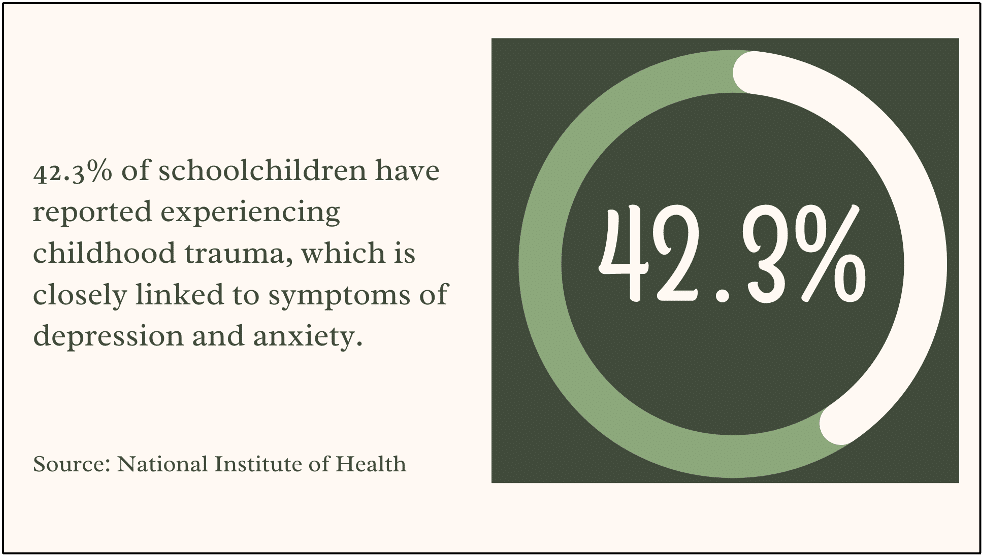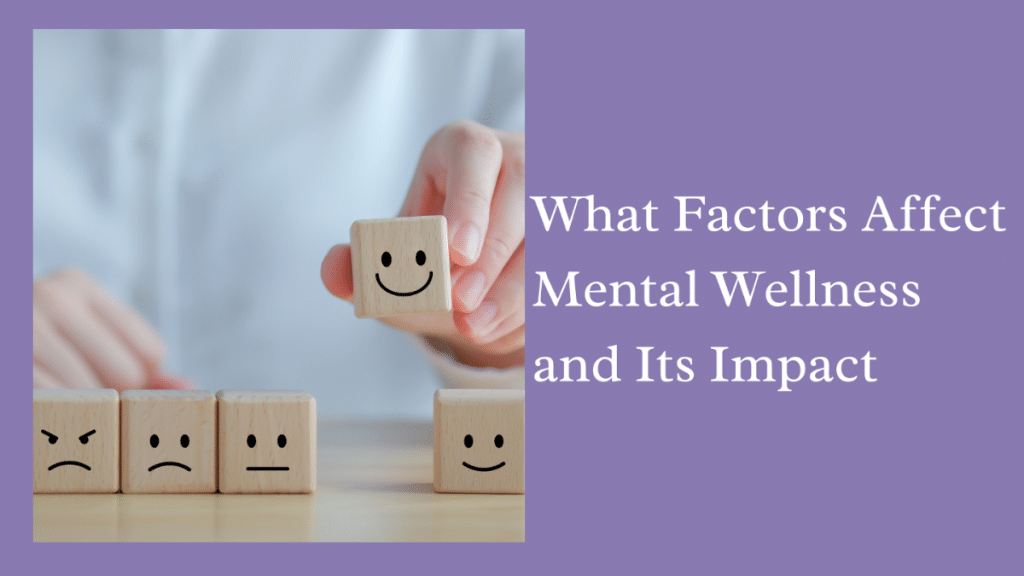Mental health is a complex tapestry woven from various threads – our genes, experiences, lifestyle choices, and physiology. Unraveling these interconnected factors provides insights into managing and promoting mental wellness for individuals and communities alike.
Environmental Influences Shaping Mental Wellness
Our surroundings profoundly impact our mental well-being, often interacting with genetic predispositions to amplify or mitigate risks.
Childhood Trauma and Adversity
Adverse childhood experiences like abuse, neglect, or unstable environments can cast long shadows, increasing the likelihood of developing mental health issues later in life. According to the National Institute of Health, 42.3% of schoolchildren reported experiencing childhood trauma, strongly associated with depressive and anxiety symptomatology.

Socioeconomic Factors and Mental Health
Income disparities and housing instability can breed chronic stress, a significant risk factor for mental disorders. The World Health Organization found that individuals in low-income households face greater mental health challenges due to increased stress and limited access to resources.
For instance, let’s consider Florida. According to the Florida Chamber of Commerce, Nearly 950,000 children younger than age 18 live in poverty in Florida. Children and families in such situations have a higher chance of developing mental health issues due to the chronic stress and lack of access to proper resources. So for them seeking support from a quality rehab Fort Lauderdale facility can be crucial.
Workplace Environment and Mental Health
Job stress, burnout, and a lack of work-life balance can take a toll on mental health, affecting productivity and overall well-being. Alarmingly, the American Psychological Association reports that 61% of employees feel stressed at work, underscoring the importance of addressing mental health and workplace productivity.
Community and Social Support
Strong social connections and a sense of belonging can buffer against mental health challenges. According to Frontiers, social support from family and friends significantly reduces the risk of depression and anxiety disorders, highlighting the role of mental health social support.
The Role of Genetic Predispositions
Nature endows us with a unique genetic blueprint that can influence our mental health trajectories. While genetic factors in mental health are not sole determinants, research indicates they contribute up to 40% to the development of certain disorders.
- Nature vs. Nurture: Family history and hereditary factors play a role, but environmental influences also shape mental wellness outcomes.
- Genetic Vulnerabilities: Variations in genes like COMT are linked to increased susceptibility to conditions like depression.
- Epigenetics and Mental Wellness: Our lifestyle choices can alter how genes express themselves, impacting brain chemistry and mental health.
Lifestyle Choices: Pillars of Mental Wellness
Our daily habits and choices exert a profound influence on our emotional and psychological well-being.
Physical Activity and Diet
Regular exercise and a balanced diet are powerful allies in regulating mood and preventing mental illness. The World Health Organization’s research shows that physical activity can reduce symptoms of depression and anxiety by up to 43%, making mental health lifestyle factors crucial.
Sleep Hygiene and Mental Wellness
Sleep disturbances are common symptoms of mental health disorders like anxiety and depression, but the relationship is bidirectional. Prioritizing sleep patterns and anxiety/depression management through good sleep hygiene can improve mental health outcomes, as highlighted in a study published in the journal Sleep.
Substance Use and Mental Health Issues
Alcohol and drug abuse can exacerbate or trigger mental health problems, often creating a vicious cycle. The National Institute on Drug Abuse emphasizes the importance of addressing substance use and mental health issues simultaneously for effective treatment.
Biological and Physiological Influences
Our bodies’ internal processes and medical conditions can profoundly shape our mental health landscapes.
Hormonal Imbalances and Mental Health
Fluctuations in hormones, such as those caused by thyroid disorders or menopause, can disrupt brain chemistry and contribute to mood changes and depression. The National Institute of Mental Health has documented the link between hormonal imbalances and behavior.
Neurological Conditions Impacting Mental Wellness
Degenerative neurological disorders like Alzheimer’s and Parkinson’s disease can increase the risk of developing mental health issues like depression and anxiety, underscoring the connection between mental health and chronic illness. A study in Neurology found that individuals with Alzheimer’s are more likely to experience these comorbidities.
Chronic Illnesses and Pain
Living with chronic physical ailments like diabetes or arthritis can take an emotional toll, increasing the risk of mental health challenges. The World Health Organization highlights the profound impact of poor mental health on individuals with chronic conditions.
The Far-Reaching Impact of Mental Well-being
The ripple effects of mental health extend far beyond the individual, shaping our relationships, productivity, and even public health.
Relationships and Social Interaction
Poor mental health can strain personal connections and increase social isolation, exacerbating the need for mental health social support. A study in Social Science & Medicine found that individuals with mental health issues are more likely to experience diminished social support and strained relationships.
Work Productivity and Economic Cost
Absenteeism, presenteeism (reduced productivity while at work), and lost employment opportunities due to mental health challenges impose significant economic burdens on individuals, organizations, and societies. The World Health Organization emphasizes the substantial financial implications of addressing mental health and workplace productivity.
Physical Health and Comorbidities
Mental and physical health are inextricably linked, with each influencing the other. The Lancet reports that individuals with mental health issues are more susceptible to comorbid physical conditions like cardiovascular disease and diabetes, underscoring the impact of poor mental health on overall well-being.
Public Health and Safety
Untreated mental health issues can have broader societal consequences, increasing the risk of substance abuse, homelessness, and even criminal behavior. The National Institute of Mental Health highlights the crucial role of accessible mental health resources in addressing these public health and safety concerns.
Factors Affecting Mental Wellness
To summarize the various factors impacting mental wellness, here’s a comparison table:
| Factor | Impact |
| Genetic Predispositions | Increased susceptibility to specific mental health conditions |
| Childhood Trauma | Long-term effects on emotional and psychological well-being |
| Socioeconomic Status | Chronic stress and limited access to mental health resources |
| Workplace Environment | Job stress, burnout, and reduced productivity |
| Social Support | Strong connections buffer against mental health challenges |
| Physical Activity | Regulates mood and prevents mental illness |
| Sleep Hygiene | Impacts anxiety, depression, and overall mental well-being |
| Substance Use | Exacerbates or triggers mental health problems |
| Hormonal Imbalances | Contributes to mood changes and behavioral shifts |
| Neurological Conditions | Increases risk of comorbid mental health issues |
| Chronic Illnesses | Emotional toll and increased risk of mental health challenges |
This table provides a concise overview of the various factors and their potential impact on mental wellness, highlighting the multifaceted nature of this complex issue.
FAQs on Mental Wellness Factors and Impact
How can someone distinguish between normal stress and a serious mental health issue?
While it’s normal to experience stress in response to life’s challenges, persistent and overwhelming stress can be a warning sign of a more serious mental health condition. If stress interferes with daily functioning, relationships, or physical health for an extended period, it’s advisable to seek professional help. Chronic stress can increase the risk of developing mental health issues like anxiety or depression, as noted in a study published in the Journal of Clinical Psychology.
What role does technology and social media play in affecting mental wellness?
The rise of technology and social media has introduced new factors influencing mental health. While these platforms can foster connections, the American Psychological Association cautions that excessive social media use can contribute to increased stress, anxiety, and depression due to the constant comparison and pressure to present an idealized online persona.
What preventive measures can individuals and organizations take to improve mental health?
Promoting mental wellness requires a multifaceted approach involving individuals, communities, and organizations.
- Individuals: Adopting healthy lifestyle habits like regular exercise, mindfulness practices, and seeking professional support when needed.
- Organizations: Implementing mental health policies, employee assistance programs, and fostering a supportive work culture that destigmatizes mental health issues.
- Communities: Promoting social cohesion, accessible mental health resources, and education to raise awareness and reduce stigma.
A study published in Health Education & Behavior found that implementing mental health programs and policies in the workplace can significantly reduce symptoms of depression and anxiety among employees.
Taking Action for Mental Wellness
Understanding the intricate web of factors affecting mental health is the first step towards promoting individual and societal well-being. By recognizing the roles of genetics, environment, lifestyle choices, and biological influences, we can develop comprehensive strategies to support mental wellness.
Whether through personal lifestyle changes, advocating for mental health resources in the workplace, or supporting community initiatives, each of us has a role to play in creating a society that prioritizes mental health and fosters resilience.
